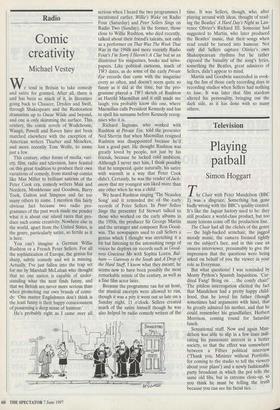Radio
Comic creativity
Michael Vestey
We tend in Britain to take comedy and satire for granted. After all, there is and has been so much of it, in literature going back to Chaucer, Dryden and Swift, through Shakespeare and the Restoration dramatists up to Oscar Wilde and beyond, and one is only skimming the surface. This century, the comic novels of Wodehouse, Waugh, Powell and Raven have not been matched elsewhere with the exception of American writers Thurber and Mencken, and more recently Tom Wolfe, to name just a few.
This century, other forms of media, vari- ety, film, radio and television, have feasted on this great tradition to produce their own variations of comedy, from stand-up comics like Max Miller to brilliant satirists of the Peter Cook era, comedy writers Muir and Nordern, Monkhouse and Goodwin, Barry Took, Galton and Simpson and far too many others to name. I mention this fairly obvious fact because two radio pro- grammes of the past week made me ponder what it is about our island races that pro- duce such comic creativity. Nowhere else in the world, apart from the United States, is the genre, particularly satire, so fertile as it is here.
You can't imagine a German Willie Rushton or a French Peter Sellers. For all the sophistication of Europe, the genius for sharp, subtle comedy and wit is missing. Actually, I've just fallen into the trap set for me by Marshall McLuhan who thought that no one nation is capable of under- standing what the next finds funny, and that we British are never more serious than when promoting our own brands of come- dy: 'One matter Englishmen don't think is the least funny is their happy consciousness of possessing a deep sense of humour.'
He's probably right as I came over all serious when I heard the two programmes I mentioned earlier, Willie's Wake on Radio Four (Saturday) and Peter Sellers Sings on Radio Two (Sunday). In the former, those close to Willie Rushton, who died recently, talked about their friend's talents, not only as a performer on That Was The Week That Was in the 1960s and more recently Radio Four's I'm Sony I Haven't A Clue but as an illustrator for magazines, books and news- papers. Like political cartoons, much of TW3 dates, as do some of the early Private Eye records that came with the magazine every so often, and doesn't seem quite so funny as it did at the time, but the pro- gramme played a TW3 sketch of Rushton as Harold Macmillan and it still made me laugh; you probably know the one, where Macmillan calls President Kennedy and has to spell his surname before Kennedy recog- nises who it is.
Richard Ingrams, who worked with Rushton at Private Eye, told the presenter Ned Sherrin that when Macmillan resigned Rushton was disappointed because he'd lost a good part. He thought Rushton was greatly loved by people, not just by his friends, because he lacked cold ambition. Although I never met him, I think possibly that he tempered, quite naturally, his satire with warmth in a way that Peter Cook didn't. Certainly, he was the reader of Jack- anoly that my youngest son liked more than any other when he was a child.
We heard Rushton singing 'The Neasden Song' and it reminded me of the early records of Peter Sellers. In Peter Sellers Sings the presenter Ed Stewart talked to those who worked on the early albums in the 1950s, the producer Sir George Martin and the arranger and composer Ron Good- win. The newspapers used to call Sellers a genius which I thought was stretching it a bit but listening to the astonishing range of voices he deploys on records such as Good- ness Gracious Me with Sophia Loren, Bal- ham — Gateway to the South and A Drop of the Hard Stuff, I know what they meant; he seems now to have been possibly the most remarkable mimic of the century, as well as a fine film actor later.
Because the programme ran for an hour, the musical excerpts were allowed to run, though it was a pity it went out so late on a Sunday night, 11 o'clock. Sellers created much of the satire himself though he was also helped by radio comedy writers of the time. It was Sellers, though, who, after playing around with ideas, thought of read- ing the Beatles' A Hard Day's Night as Lau- rence Olivier's Richard III. Someone had suggested to Martin, who later produced the Beatles' music, that their songs when read could be turned into humour. Not only did Sellers capture Olivier's own Shakespearean rhythms but he rather exposed the banality of the song's lyrics, something the Beatles, great admirers of Sellers, didn't appear to mind.
Martin and Goodwin succeeded in evok- ing the fun of those early recording days in recording studios when Sellers had nothing to lose. It was later that film stardom altered his personality, bringing out the dark side, as it has done with so many others.










































































 Previous page
Previous page